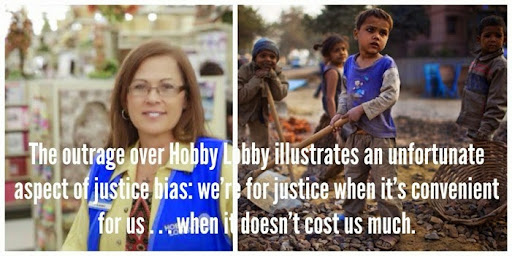
This week the Supreme Court ruled in favor of Hobby Lobby’s right to deny coverage of birth control methods they deem to be “abortifacients,” and it seems like the whole internet exploded in outrage. My facebook and twitter feed were lit up with rants about women’s rights and boycotts and religious tyranny. And I get it. I wasn’t really thrilled with the decision myself. I think access to birth control is a pretty vital component in reducing abortions, and I personally don’t believe that Plan B or the other drugs they are denying their employees are abortifacients. (I talk more about my thoughts on that here.) I also understand how people feel leery of a secular store creating policies around religion that they then hold over their employees, who may or may not share their faith. It’s a slippery slope.
At the same time, I do find the level of outrage confounding. Or more accurately, I find the lack of outrage on other justice issues confounding. Admittedly, much of my reaction is viewing all of this through the cloud of having visited with an anti-trafficking organization in S.E. Asia last week. I’m still reeling from what I saw and from the injustice that exists in the world, particularly in relation to the trafficking of women into the sex trade.
While I’m frustrated by the Hobby Lobby decision, I’m also aware that this organization still offers 16 of the 20 birth control methods approved by Food and Drug Administration to employees. I’m aware that their employees can choose other methods, or pay out-of-pocket, or seek other avenues with funding for birth control, or find other employment. It’s annoying and no doubt may prove to be a major inconvenience to some employees. But in the scheme of things, I can’t help thinking . . . on the list of labor abuses happening in our world today, this is pretty low on the totem pole.
That’s not to say that people shouldn’t continue with their boycotts and their activism. I don’t believe in playing the Oppression Olympics because doing so means that every issue is muted save for the most dire. I guess what I’m wanting to ask, though, is why we are so quick to get behind a labor issue that is, ultimately, more of a first-world problem, while turning a blind eye to major labor abuses occurring in the supply chain of stores and companies that we use every day.
For most of us, a Hobby Lobby boycott is pretty easy. If you’re crafty you can get the supplies somewhere else . . . if you’re like me, you can not even think twice because Hobby Lobby is not a store that you were even enter. But on my trip to S.E. Asia, Matt Parker, the founder of Exodus Road, talked to us a bit about some of the labor trafficking they are investigating, and how prevalent it is in certain industry. Shrimp, for example. I had no idea that many people are held against their will for months or even years at a time on shrimping boats, for shrimp that is later sold to companies like Costco and Walmart. I’ve talked about the reality of child labor in mainstream chocolate before. This is also true for coffee. When we really peel back the layers, there are labor abuses happening in the production of many of the things we buy on a regular basis, from produce to clothing to electronics.
So why are we so willing to boycott Hobby Lobby, and not some of the companies were people in the labor chain are being abused, or trafficked, or working in conditions that we find abhorrent? I’m asking this question of myself, too, because God knows I’ve turned a blind eye to some of this in my own purchasing practices. Sadly, I think the outrage over Hobby Lobby illustrates an unfortunate aspect of justice bias: we’re for justice when it’s convenient for us . . . when it doesn’t cost us much.
I’m not calling for a boycott of the boycott. If you want to protest Hobby Lobby, go for it. I’m just saying that if labor abuse is an issue we truly care about, we’ve got bigger fish to fry, in ways that may come at a cost.